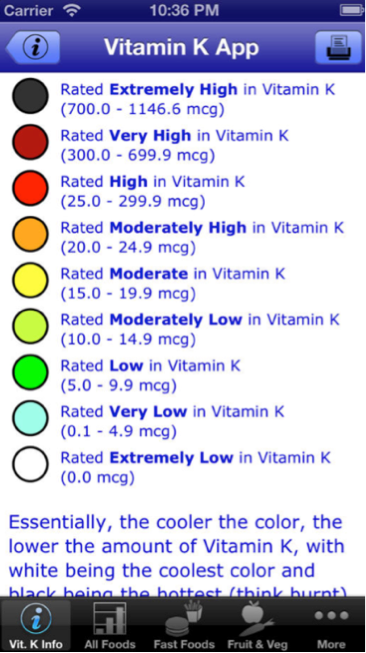Article
App Tracks Vitamin K Intake for Warfarin Patients
Pharmacists know changes in vitamin K intake can drastically alter INR values in patients taking warfarin.
Pharmacists know changes in vitamin K intake can drastically alter international normalized ratio (INR) values in patients taking warfarin. As a result, they often counsel patients to maintain consistent intake of vitamin K and avoid introducing kale, spinach, and other leafy greens to their diets while taking the drug.
But pharmacists often overlook other potential sources of vitamin K. After all, more than 1000 foods contain the nutrient, according to the US Department of Agriculture (USDA) National Agricultural Library.
To complicate matters, a food’s vitamin K content varies based on its preparation. For example, a single baby carrot contains 1 mcg of vitamin K—a minimal amount—while a cup of canned carrot juice contains 37 mcg.
How can patients and providers keep track?
A little-known mobile app called Vitamin K- iNutrient: Vitamins K1, K1D & K2 offers a solution. This app provides information about foods’ vitamin K content based on preparation and serving sizes.
The foods are rated from “Extremely Low” to “Extremely High” in vitamin K content, and they are color-coded for clarity. For example, 1 cup of cooked kale containing 1062 mcg of vitamin K receives a black (“Extremely High”) rating, while that single baby carrot receives a blue (“Very Low”) rating.

The Vitamin K- iNutrient app food rating guide.
The app integrates the vitamin K content of 930 foods from the USDA National Nutrient Database into a convenient, mobile library. Users can search for foods using approximately 2500 phrases, as some foods are known by different names and preparations (eg, "Egg, Scrambled" and "Scrambled Egg").
Researchers at the Medical University of South Carolina found warfarin caused at least 33,000 hospitalizations and 67,000 hemorrhages between 2007 and 2009. Another study from the US Centers of Disease Control and Prevention determined that warfarin was implicated in one-third of all adverse drug events in older adults.
Putting vitamin K content at patients’ fingertips makes warfarin a safer option for those with fluctuating diets.






